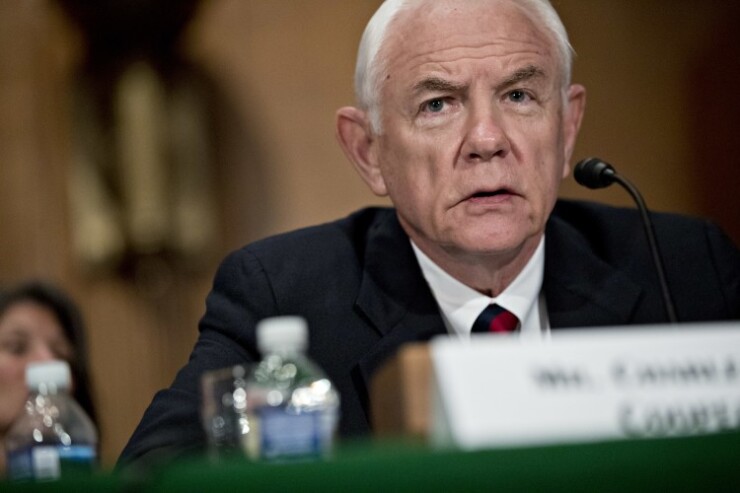Texas Banking Commissioner Charles Cooper may be tossing cold water on de novo activity in his state.
Cooper, in
The order also questioned the need for another bank in the targeted market.
A spokesman for the Texas Department of Banking declined to discuss the Tyme situation for this report, though he confirmed the group’s application is the only one the agency has denied in the past decade.

Public rejections of applications are rare and can be used to make a bigger point, industry observers said.
While the issue could be specific to Tyme or the Dallas market, the view from some outsiders is that Cooper — the state's banking commissioner since 2008 and the Conference of State Bank Supervisors' representative on the Financial Stability Oversight Council — is questioning the rationale for opening a bank during the economic crisis caused by the coronavirus pandemic.
“It looks like there are concerns about the environment,” said Chip MacDonald, a lawyer at Jones Day.
“This is not the right time or place and the proposed bank doesn’t offer compelling services that are needed by the community, at least in the commissioner’s view,” MacDonald added. “It is very subjective, but we’re in a difficult situation right now.”
Tyme filed an
A proposed merger between Texas Capital Bancshares, one of the biggest banks in Dallas, and Independent Bank in McKinney, Texas,
Texas Capital's struggles “would also indicate risk in the market,” MacDonald said.
“It’s only been a few years since new charters have been getting serious consideration, and now we’re in the middle of a pandemic,” said Dan Hudson, CEO of NuBank, a consulting firm that focuses on de novo efforts. “Regulators are always going to err on the side of caution.”
It makes sense that the Texas Department of Banking, known for being tough but fair, would take a cautious approach to de novos now, said Christopher Williston, president and CEO of the Independent Bankers Association of Texas.
Still, Williston said he thinks it is possible for a group to get an application approved.
“I don't think there's any desire to throw the brakes on, but you have to have a rock-solid business plan,” Williston said. "Timing could be everything in this instance. We don't know what the full impact of the pandemic will be business-wise. Are we in recovery mode? Delayed-impact mode?”
Tyme’s organizers are hoping to resubmit their application in the next four to six months.
“We’re still on course,” said Joseph Hansen, who is set to become CEO. “It’s a difficult strategic environment, but the market needs us, so we’re going to meet the needs of that market.”
The proposed bank’s organizers had been looking to raise $32 million to $36 million with a plan of targeting small businesses overlooked in the wake of consolidation in and around Dallas.
The Texas Department of Banking “did not give us definite revisions or milestones” for refiling, said Ken Judd, who would be the bank’s chief financial officer. “They didn’t give us any specific visibility with respect to timing, but they did invite us to refile when we thought the timing was best.”
Cooper “is as consultative a bank regulator as you can find," Williston said. "I'd be surprised if this totally closes the door.”
The organizing group would be well served to add more business professionals to its board, Hudson said.
Many of Tyme’s organizers have ties to Valkyrie Equities, including Hansen, a longtime Dallas-area banker, though the group has said there will be no connection between the bank and the brokerage firm. Several other proposed directors are involved in real estate development.
In addition to Hansen, two bankers are part of the organizing group: Patti McKee, a former CFO at ViewPoint Bank, and Tom Yenne, who was an executive vice president at Green Bancorp.
Tyme is one of two banks seeking to open for business in Texas.
Organizers of Agility Bank, which has applied with the Office of the Comptroller of the Currency for a national charter, said it is on track to open in Houston in the fourth quarter, said Lauren Sparks, who would be the bank’s CEO.
Despite the state’s difficult economy, a new bank does hold some good cards, Sparks said.
“We all know we’re heading toward better times,” she said. “Starting with a clean slate is a real advantage.”
Paul Davis contributed to this report.





